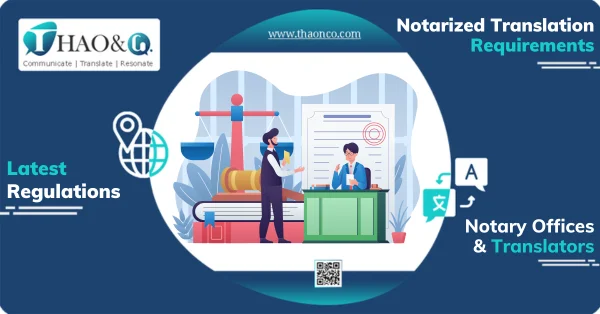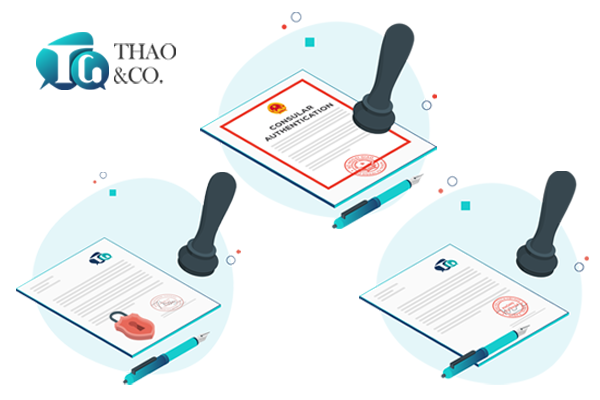How to notarize a translation? Notarized translation is always in high demand. Gaining detailed insights into notarized translation can be immensely helpful in navigating relevant administrative procedures.
In this article, Thao & Co. offers the latest information on notarized translation. Keep reading to find out!
How to notarize a translation: standard procedure
The requested documents go through two stages: Translation and Notarization.
Once the documents have been translated, notaries from either judicial or private offices will proceed with the notarization where the competent authority verifies the translators’ signatures.
For translators
The conditions to be satisfied are as follows:
- • Have full civil act capacity
- • Collaborate with notarial practice organizations
- • Have a Bachelor’s degree in the relevant languages. Degrees in other majors are acceptable as long as language proficiency is guaranteed.
- • Take full responsibility for ensuring accurate and credible translations.
For translations
Notarized translation is more than just language conversion. A translation should be clear and accurate. In order to be notarized, it should be legally valid.
The following is a checklist of requirements for a translation to be notarized:
- • The translation is devoid of erasure or correction.
- • The translation conveys the exact content of the source text.
- • The translation is error-free in terms of meaning, spelling, grammar, etc.
- • The documents submitted for notarization must have the issuing organization’s signature and seal.
- • For documents with multiple pages, seals should be placed where the pages meet.
- • Unsealed foreign documents may require consular authentication before notarization.
Which documents are required for notarizing a translation?
A dossier for notarized translation services includes:
- • Notary Request Form adhering to the format required by notary offices
- • Original document(s)
- • Translation(s)
- • Personal identification papers (originals) of the person requesting notarization (identification card, valid passport, etc.)
Cases ineligible for notarized translation
As regulated by the law, notaries do not implement notarization in the following cases:
- • Documents that are either issued by an unauthorized agency or are counterfeit, with origins that cannot be authenticated.
- • Original documents and papers with signs of editing, erasure, additions, deletions, wear, or damage, rendering the precise content indeterminable.
- • Papers or documents requested for translation are classified as state secrets or prohibited from dissemination by law.
Requirements for notaries
A notary is deemed competent for notarization upon fully meeting the following conditions:
- • Be a Vietnamese citizen with a clean background
- • Have a university degree in law and at least 5 years working in the field
- • Be certified for completing notary training courses
- • Meet requirements on notarial practice probation results
- • Ensure adequate health for notarial practice
In addition, upon receipt of original and translated documents, a notary must execute the following procedures in accordance with legal requirements:
- • Check whether the translations have adequate content and appropriate format.
- • Check whether the signatures of collaborating translators are legally valid.
- • Write testimonies and sign every page of the translations, then append the “Translation” marks in the upper right empty space. The translations shall be accompanied by copies of the original documents, with seals overlapping onto each page.
- • Notarial testimonies on translations should include the full names of the notary and translators, along with the date and location of notarization. They must affirm that the translators’ signatures are authentic, the translations are faithful, and they comply with all legal and ethical standards.
Requirements for notary offices
Notary offices in practice shall fulfill the following requirements:
- • Have notaries that satisfy conditions regulated by law
- • Assign a practicing notary with at least 2 years in practice to be the head of the office
- • Name the office according to the law
- • Have a headquarters with clear contact information
- • Use seals bearing no national emblem
Latest update on how to notarize a translation
The process of notarized translation, as per legal requirements, involves several steps:
- Step 1: A translator performs the translation and signs off on each page of the translation.
- Step 2: A notary receives the document and verifies its validity.
- Step 3: The notary signs the document, writes testimonies, and affixes seals.
- Step 4: The original and translated documents are delivered to the client.
Note: You can get translations at notary offices or by reaching out to private translation services that employ translators registered with a notary office for expedited assistance.
Where to find a professional notarized translation service?
You can get notarized translations for your documents at:
- • Public notary office: a government agency whose main function is providing notarization. Translations are performed by collaborators.
- • Private notary office: This type of notarization service provider also collaborates with freelance translators.
- • Translation company: Besides professional translators, most translation companies have legal specialists to assist in notarial services.
Translation companies are a favored option thanks to their quick turnaround time. Translation quality is ensured by an internal team of professional translators.
Get accurate and legally valid translations with Thao & Co. Choosing our high-quality services, you can expect:
- • Professional translators: Our expert linguists possess strong translation backgrounds, guaranteeing precise translations meeting all legal standards.
- • Fast turnarounds: Enjoy speedy translation services at Thao & Co. Translations for standard documents are delivered within 24 hours.
- • Dedicated support: Our specialists are experienced in notarial procedures, ensuring a smooth experience.
- • Reasonable costs: Benefit from our notarized translation services at a budget-friendly price.
- • Guaranteed confidentiality: All client information is safeguarded through industry-standard Non-Disclosure Agreements (NDAs).
- • Convenience at every step: Thao & Co.’s proprietary platform enables easy progress tracking and file management.
When it comes to notarized translation, it’s important to follow the law and have a good understanding of how it all works. For a smooth and speedy experience, consider a professional notarized translation service.
Don’t know how to notarize your translation? Thao & Co. can help. Drop your information on our Get a Quote page today. We’ll get back to you with a free consultation.

